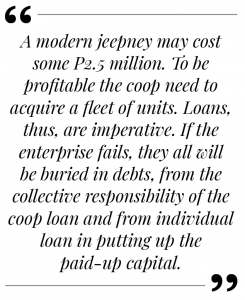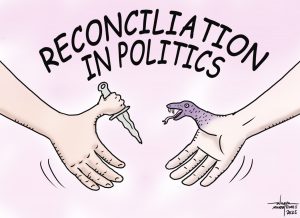 NAAWAN, Misamis Oriental (MindaNews) – Who is against a jeepney that is spacious, with comfortable seats, air-conditioned, sound-proof and free from air pollutants and may offer a cashless payment for the ride and with a CCTV for the convenience and security of its passenger?
NAAWAN, Misamis Oriental (MindaNews) – Who is against a jeepney that is spacious, with comfortable seats, air-conditioned, sound-proof and free from air pollutants and may offer a cashless payment for the ride and with a CCTV for the convenience and security of its passenger?
The vehicle is even run by electricity and, therefore, leaves no carbon footprints in its path.
Definitely no one. The commuting public across the country will root for it and many is already excited by just thinking of such a dream-like vision.
Yet, some in the transport sector are not so happy about its advent, especially the single traditional jeepney operators who also are driving their own jeepney. They, accordingly, cannot afford ownership of such ideal vehicle. They will lose their traditional jeepney and their livelihood when the government will really push hard to materialize the ideal transport in the road.
Their opposition starts with the directive of the Land Transportation Franchising and Regulatory Board (LTFB) to traditional jeepney operators to consolidate their franchises and form into a corporation or a cooperative. The consolidation would pool their resources to acquire the modern jeepney with some funding support from the government in the form of loans.
Consolidation requires that they first surrender their respective franchise to the LTFRB. The operators are apprehensive that the surrender will technically stop them from plying their jeepneys and deprive them of their income. Despite the assurances of the LTFRB, the apprehension persists particularly among single operators.
Moreover, their apprehension leaps to the future operation of the corporation or cooperative that they are compelled to join. What if this is mismanaged because of inexperience or other reasons? They will lose their investment – their individual paid-up capital in the amount of some P300,000, plus the other expenses needed in consolidation.
A modern jeepney may cost some P2.5 million. To be profitable the coop need to acquire a fleet of units. Loans, thus, are imperative. If the enterprise fails, they all will be buried in debts, from the collective responsibility of the coop loan and from individual loan in putting up the paid-up capital. They will have nothing to lean on to make both ends meet in the family.
The LTFRB on Wednesday reminded operators of public utility vehicles (PUV) to consolidate by Dec. 31 as it will be a requirement for vehicle registration next year.
Without registration there would no movement of public utility vehicles in the streets. Life stands still. The economy may slide to the precipice by the government’s own “tigil pasada”.
There is no more need for Piston and Manibela to stage a transport strike again to prove a point and to express their displeasure over the PUV Modernization Program.
Now, here’s the catch of the ambitious program. If the small transport operators could not make it, then big business, those in the corporate industry may take the wheel. For, instance, it was reported that in 2022, Manny Pangilinan, the telecommunication tycoon, invested P1.5 billion in modern jeepney operator Byahe, which is set to add 500 units to its fleet by 2027. Byahe, accordingly, operates in Metro Manila, Pampanga, and Nueva Ecija.
I suppose an executive order emanating from LTFRB is not sufficient to drive a transport modernization program that affects a great scope of the economy and the Philippine society at large. The order could even be unconstitutional. To cure the defects, doubts, uncertainty, and confusion over its implementation, a well-thought Congressional Act may be needed.
At the end, whom the gods favor win.
(MindaViews is the opinion section of MindaNews. William R. Adan, Ph.D., is retired professor and former chancellor of Mindanao State University at Naawan, Misamis Oriental)






